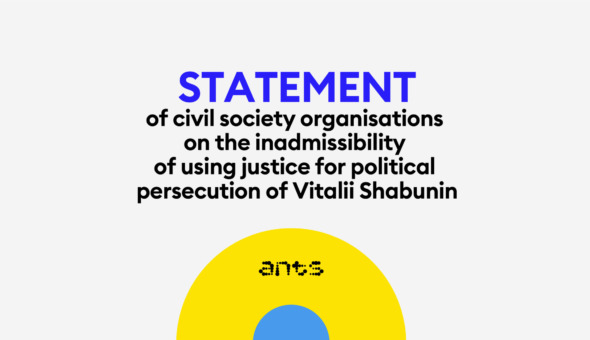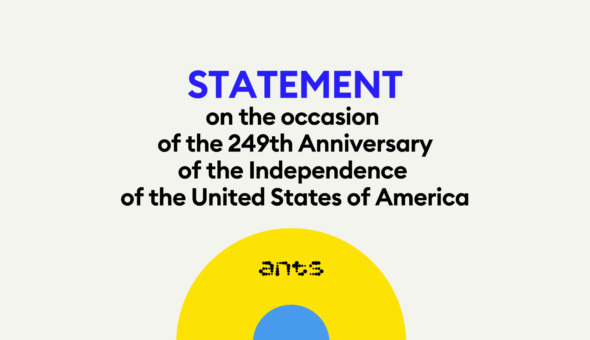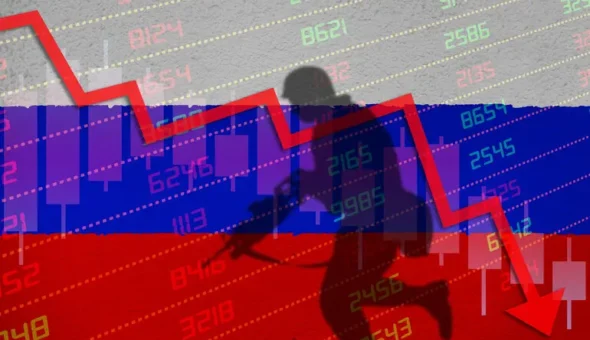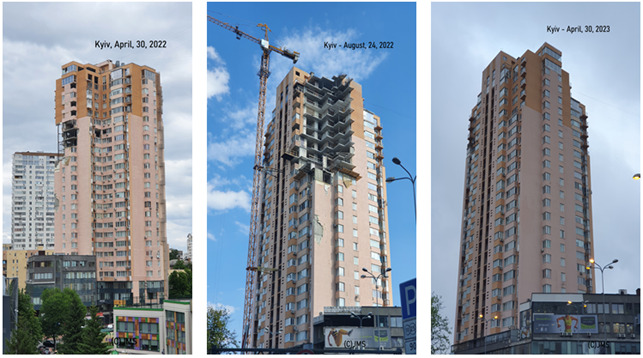
On the thorny path to compensation for the victims of russian aggression and bringing the aggressor country to economic responsibility by confiscating the assets of the russian federation and its residents.
The Fourth Summit of Heads of State and Government of the Council of Europe, held in Reykjavík, adopted a historic decision to create a Register of Damages Caused by russian Aggression Against Ukraine (hereinafter the Register).
For Ukrainians, the statement that russia should bear fair economic responsibility for the destruction caused to Ukraine by military aggression has been an axiom since the first days of the war. Everyone knows that axioms do not need to be proved.
On May 17, 2023, the irrefutability of this axiom was confirmed by 44 countries: Albania, Austria, Belgium, Croatia, Cyprus, the Czech Republic, Denmark, Estonia, Finland, France, Georgia, Germany, Greece, Iceland, Ireland, Italy, Latvia, Liechtenstein, Lithuania, Luxembourg, Malta, Republic of Moldova, Monaco, Montenegro, Netherlands, North Macedonia, Norway, Poland, Portugal, Romania, San Marino, Slovak Republic, Slovenia, Spain, Sweden, Ukraine and Great Britain, as well as Canada, Japan, Mexico, USA and the European Union, which have acceded to the Enhanced Partial Registry Agreement established within the framework of the Council of Europe, and Andorra, Bulgaria and Switzerland, which have expressed their intention to accede.
We should be happy that we finally have not another declaration but the first real mechanisms for the implementation of fair compensation for the damages caused by russian aggression.
During his speech at the Summit, the Prime Minister of Ukraine, Denys Shmyhal, emphasized: “The first step is the creation of an international Register of Ukraine’s losses due to russian aggression. Today’s relevant decision is, without exaggeration, historic. After that, we have to prepare the necessary legal framework for the confiscation of russian assets as well as create a Compensation Fund. These decisions will become an integral part of the full-scale restoration of Ukraine.”
In order to develop proposals for the means and legal instruments of compensation for damage and losses caused to Ukraine as a result of the armed aggression of the russian federation, including reparations, confiscation, and contributions, as well as steps for their implementation taking into account international legal mechanisms, international experience, and judicial practice by Decree of the President of Ukraine No. 346/2022 of May 18, 2022, a relevant Working Group was created, the result of which was, in particular, the development of documents on which the created Register of Losses is based.
“The basis of the work of this group, in which I had the honor to be included, was the concept of a compensation mechanism, which I and my colleagues began to develop in the first weeks of the war. The path from the concept to the creation of its first part took less than a year. In international law, this is the third cosmic speed!” noted a member of the Working Group, Markiian Yuriyovych Kliuchkovskyi, founder of the Asters Law Firm and a member of the Advisory Council of the School of Law of the Ukrainian Catholic University.
To date, the creation of the Register of Damage Caused by the Aggression of the russian federation Against Ukraine (Register of Damage Caused by the Aggression of the russian federation Against Ukraine) is the most significant international practical achievement on the way to compensation for war losses caused by russian armed aggression against Ukraine.
On the eve of the historic Summit, the Committee of Ministers, on May 12, 2023, at the 1466th meeting of deputy ministers, adopted Resolution CM/Res(2023)3 on the establishment of the Expanded Partial Agreement on the Register of Damages Caused by the Aggression of the russian federation against Ukraine (Resolution CM/Res(2023)3 establishing the Enlarged Partial Agreement on the Register of Damage Caused by the Aggression of the russian federation Against Ukraine).
The resolution was adopted by representatives of European countries: Albania, Austria, Belgium, Croatia, Cyprus, Czech Republic, Denmark, Estonia, Finland, France, Georgia, Germany, Greece, Iceland, Ireland, Italy, Latvia, Liechtenstein, Lithuania, Luxembourg, Malta, Republic of Moldova, Monaco, Montenegro, the Netherlands, North Macedonia, Norway, Poland, Portugal, Romania, San Marino, Slovak Republic, Slovenia, Spain, Sweden, Ukraine and Great Britain, as well as representatives of the European Union, Canada, Japan, and the USA.
The resolution notes in particular:
– on repeated resolute condemnation of the aggression of the russian federation against Ukraine and expression of full support for Ukraine and solidarity with its people;
– that on March 16, 2022, the Committee of Ministers decided to exclude the russian federation from the Council of Europe as a result of its aggression against Ukraine, which is a serious violation by the russian federation of its obligations under Article 3 of the Convention. The Charter of the Council of Europe and international law;
– on the decisions of the Committee of Ministers of September 15, 2022, and February 24, 2023, which welcome ongoing efforts, in cooperation with Ukraine, to ensure full compensation for damage, loss, or damage caused by the russian federation’s violation of international law in Ukraine;
– that taking into account the Resolution of the General Assembly of the United Nations A/RES/ES-11/5 of November 14, 2022 “Furtherance of remedy and reparation for aggression against Ukraine” Ukraine”, which recognizes, inter alia, that the russian federation must bear the legal consequences of all its internationally wrongful actions in or against Ukraine, including compensation for damages and any harm caused by such actions, and noting that this resolution also recognizes the need to create an international compensation mechanism and recommends the creation of an international damage register in cooperation with Ukraine;
– that the Parliamentary Assembly of the Council of Europe, in its Resolution 2482 (2023) “Legal and human rights aspects of the aggression of the russian federation against Ukraine” repeated its call to member states to create an international compensation mechanism and, as a first step, an international damage register;
- by the decision of April 19, 2023, the Committee of Ministers was allowed to create a Register of Damages caused by the aggression of the russian federation against Ukraine in the form of an Extended Partial Treaty within the framework of the Council of Europe.
It was decided to create an Expanded Partial Agreement on the Register of Damages Caused by the Aggression of the russian federation Against Ukraine (hereinafter referred to as the Register), which will serve as a record in documentary form of evidence and claims regarding information on damages caused to all interested individuals and legal entities, as well as to the State of Ukraine (including its regional and local authorities, state or controlled institutions), caused on or after February 24, 2022 on the territory of Ukraine within its internationally recognized borders, extending to its territorial waters, as a result of internationally illegal actions of the russian federation in Ukraine or against Ukraine.
It should be remembered that in accordance with the Law of Ukraine of April 15, 2014, No. 1207-VII “On ensuring the rights and freedoms of citizens and the legal regime in the temporarily occupied territory of Ukraine”, the date of the beginning of the temporary occupation by the russian federation of certain territories of Ukraine is February 19, 2014.
Since February 19, 2014, the aggressor country has systematically caused damage to Ukraine, in particular by occupying oil and gas production facilities within the continental shelf of Ukraine, confiscating and destroying a significant number of facilities, and killing and causing suffering to many Ukrainian citizens.
It would be fair if the compensations were also applied to the period from February 19, 2014 to February 24, 2022.
The registry of damages caused to Ukraine by russian aggression was created within the framework of the Enlarged Partial Agreement (EPA), which allows a separate group of member states to cooperate more closely and carry out joint actions within the framework of the Council of Europe without the participation of all member states.
This makes it possible to avoid the blocking of decisions by individual CE member states as well as to expand support due to the participation of third parties that are territorially located outside of Europe.
Unfortunately, 6 member states of the Council of Europe did not sign the Treaty.
In particular, Hungary, a member of the EU and NATO, did not join the treaty; Turkey, a member of NATO; Serbia; Bosnia and Herzegovina, Armenia and Azerbaijan. According to the procedures of the Council, the “against” vote is not recorded anywhere. However, non-adherence to the Register shows that we still have a lot of work to do in the fight for justice to defend common European values.
The Summit was pleasantly surprised by Mexico’s accession to the treaty on the register of losses from russian aggression.
Now we have an important diplomatic goal: to be able to convince more than half of the UN members to join the treaty and make it a binding international reality, provided that the work of the UN Security Council is blocked due to the veto of the permanent member of russia, which is an aggressor state.
There are 193 countries in the UN. To ensure such an ambitious task, 97 votes of support are needed.
The list of unfriendly countries approved by the government of the russian federation includes 49 countries, including Australia, Albania, Andorra, the Bahamas, Great Britain, countries of the European Union, Iceland, Canada, Liechtenstein, Micronesia, Monaco, New Zealand, Norway, the Republic of Korea, San Marino, North Macedonia, Singapore, the United States of America, Taiwan, Ukraine, Montenegro, Switzerland, and Japan.
There is no doubt that Australia, New Zealand, the Republic of Korea, Singapore, and Taiwan will join the Register in the near future.
Resolution of the United Nations General Assembly A/RES/ES-11/5 of November 14, 2022, was supported by 94 countries.
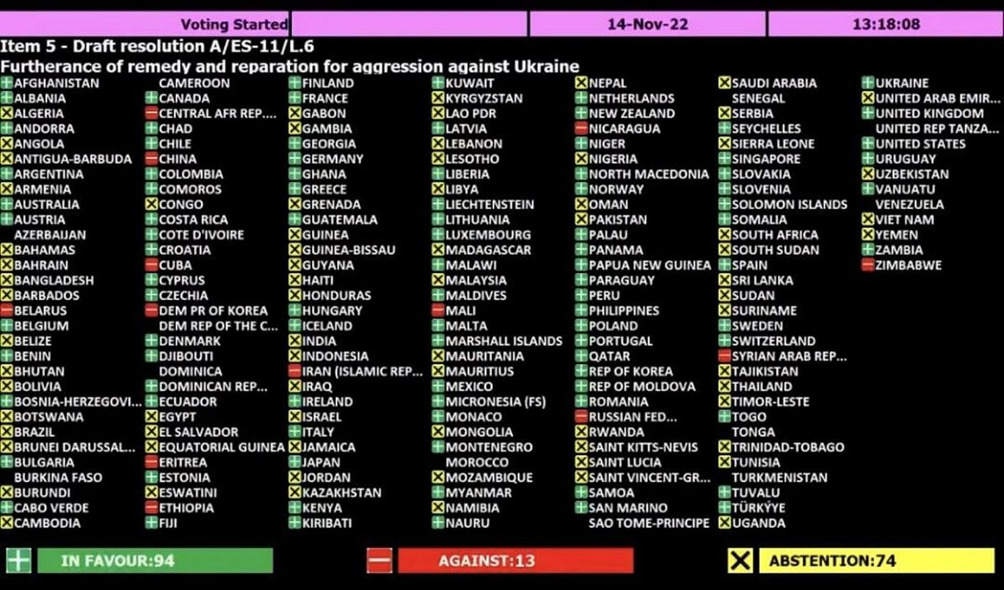
It should be recalled that on March 2, 2022, the UN General Assembly condemned russia’s invasion and called on moscow to immediately withdraw all troops from Ukraine. 141 countries voted for the resolution; 5 were against, and 35 abstained. The document contains an acknowledgment that russia has committed aggression and that its actions violate basic UN norms. “Demands the russian federation to immediately, completely, and unconditionally withdraw all its armed forces from the territory of Ukraine within its internationally recognized borders,” the resolution reads.
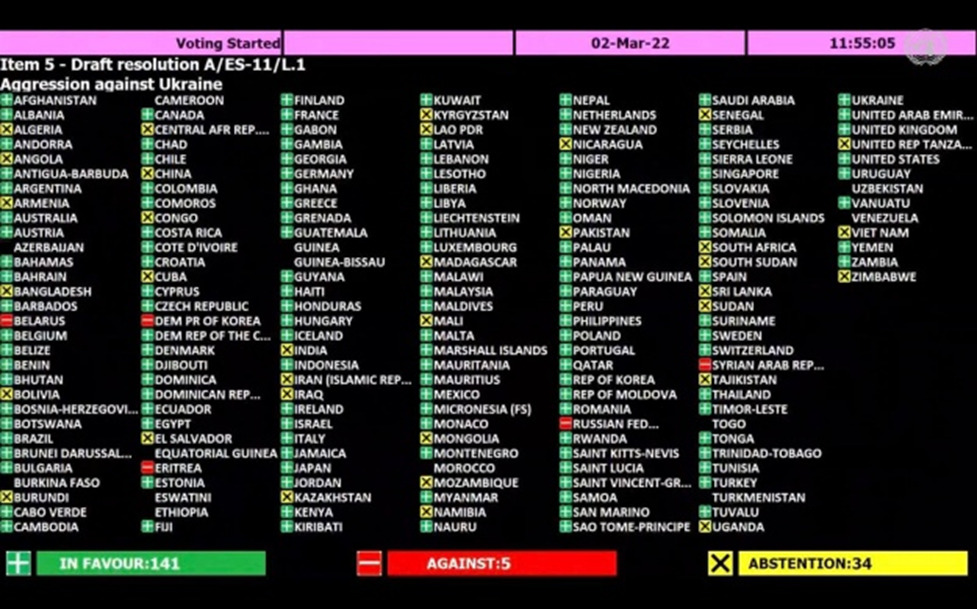
Our diplomats and foreign partners have the opportunity to significantly increase support for Ukraine, in particular through active participation in the Register.
Article 4 of the Statute of the Registry, which is an annex to Resolution CM/Res(2023)3 of May 12, 2023,2023, provides that any member state or observer of the Council of Europe and the European Union, as well as any other state that voted in favor of United Nations General Assembly Resolution A/RES/ES-11/5 of November 14, 2022 “Supporting Remedies and Reparations for Aggression Against Ukraine”, may join the Register as a Member or as an Associate Member by notification at the Secretary General of the Council of Europe. Associate members may become Members at any time by sending a notification to the Secretary General of the Council of Europe. Any other state can also join the treaty with the consent of other participants and “especially taking into account the position of the Government of Ukraine.”
In accordance with the approved Statute, the “Register of Damages Caused to Ukraine by russian aggression” will be created in the form of a legal entity, which will be located in The Hague and in Kyiv (satellite office).
On February 17, 2023, the Government of the Netherlands officially agreed in principle to Ukraine’s proposal to create an international organization in The Hague, the Register of Damages Caused by russian aggression to Ukraine. The Hague is the legal capital of the world, in which the International Court of Justice of the United Nations, founded in 1945, and the International Criminal Court (including the International Criminal Tribunal for the former Yugoslavia and the pre-trial detention center subordinate to the United Nations), founded on the basis of the Rome Statute, and Europol operate. European Union Agency for cooperation in the sphere of law enforcement activities.
According to the Deputy Minister of Justice of Ukraine, Iryna Mudra, “Active preparatory work is already underway with Dutch partners for the quick, actual launch of the Registry. The premises in The Hague where the Registry will be located have already been found, and a powerful security and protection system is being discussed. The selection of qualified personnel, the formation of the management bodies of the legal entity of the owner of this register, the selection of IT solutions for the maximum digitalization of the Register, the purchase of IT equipment, the development of rules and procedures for the work of the register itself, and the application forms that will be required to be submitted to citizens of Ukraine, businesses, or the state, to all victims of the war in the Register”.
The management bodies of the Register will be: the Conference of Member States (Conference of Participants), the Board, the Executive Director, and the Secretariat. The register was created for an initial period of three years.
It should be understood that the Register was created as a temporary institution whose actions are limited in time. In accordance with Article 14 of the Statute “Transfer, Succession, and Termination”, after the creation of the Compensation Mechanism, the work of the Registry is transferred to the Compensation Mechanism in such a way as to ensure the uninterrupted operation of the Registry until its termination. Such transfer will relate to the Registry’s digital platform, including all claim information and evidence contained therein, other documentation, including archives, its movable and immovable property, including but not limited to bank accounts, IT equipment, software, and any licenses thereto, contracts and agreements of the Registry, as well as any related data.
The Board should propose the necessary rules and procedures to ensure a properly smooth transition of the Registry to such a Compensation Mechanism. These rules are approved by the Conference.
The compensation mechanism shall become the legal successor of the Registry upon completion of such a transfer. Upon completion of such transfer, as determined by the Board and confirmed by the Conference, the Registry shall cease to exist as an extended partial agreement of the Council of Europe.
This is one of the risks regarding the efficiency and productivity of the employees of the Secretariat of the Registry, who, having no guarantees in the next employment in a new institution, may have a potential conflict of interests.
The register will be created as a platform for intergovernmental cooperation operating within the institutional framework of the Council of Europe. The Registry will receive and process information about claims for damages and evidence; classify and systematize such claims; evaluate and determine the suitability of claims for inclusion in the Register; and record eligible claims for future review and adjudication.
The Registry has no adjudicative functions with respect to such claims, including the determination of liability and the allocation of any payments or compensation.
The eligibility criteria for recording claims in the Register for future consideration and resolution shall be set out in the rules and regulations of the Register, taking into account that such claims must be made in respect of damage, loss, or damage that has been caused:
- February 24, 2022, or later;
- on the territory of Ukraine within its internationally recognized borders, which extend to its territorial waters;
- internationally illegal actions of the russian federation in or against Ukraine.
Claims, evidence, and related information are submitted to the Register by interested individuals and legal entities, as well as the state of Ukraine (including its regional and local authorities, as well as business entities owned or controlled by the state).
According to Markiian Kliuchkovskyi, “Everyone will be able to register their claim. It is not only about destroyed housing and other property. Such claims include claims related to loss of life or health, torture, sexual violence, deportation and other war crimes, loss of work and earnings, loss of business, forced resettlement or displacement, damage caused to historical and cultural heritage, the surrounding environment, etc.”
The Registry will work with relevant national and international partners to facilitate and coordinate the collection of evidence of damage, loss, or damage caused by the russian federation, internationally illegal acts in or against Ukraine.
The work of the Register, including its digital platform with all data on claims and evidence recorded in it, should become the first component of the future international Compensation Mechanism, which will be created by a separate international instrument in cooperation with Ukraine (hereinafter the “Compensation Mechanism”).
The exact form of the future Compensation Mechanism will be determined; it may include a Claims Review Commission and a Compensation Fund authorized to review claims, and make decisions, and/or pay compensation for damage, loss, or injury caused by the internationally wrongful actions of the russian federation in or against Ukraine.
The Registry’s Ukrainian support office will aim to provide ongoing communication with the Government of Ukraine and facilitate outreach to potential applicants and the public in Ukraine as a whole, particularly regarding the operation and purpose of the Registry and the procedure for filing claims for damages.
The General Agreement on Privileges and Immunities of the Council of Europe will apply to the Register and its officials, including the Register’s satellite office in Ukraine.
The Registry will be funded by annual contributions from its Members and voluntary contributions from its Associate Members. The Conference shall determine both the amount of the annual contributions of its Members and the recommended voluntary contributions of its Associate Members.
These contributions shall be based, as a rule, on the criteria for determining the annual scale of contributions to the general budget of the Council of Europe and may be adjusted in accordance with the principles on which this scale is based. The Registry may receive and use additional voluntary grants and other contributions related to its work, including contributions in kind, subject to the prior approval of the Conference.
The main body of the Register is the Conference of Participants, which:
– bears overall responsibility for the execution of the powers of the Register;
– recommends to Participants and Associate members measures to promote the purposes of the Register;
– approves the rules and regulations proposed by the Board for managing the work of the Register;
– appoints members of the Management Board;
– appoints the Executive Director at the request of the Government of Ukraine;
– approves the annual budget of the Register;
– approves the annual report on the activities of the Register;
– performs any other functions assigned by this Charter.
The conference shall meet as often as necessary, but at least once a year. Importantly, the Conference may make decisions by written procedure and by electronic means.
There is no need for 100% consensus for decision-making, as in the case of decision-making in the EU. The Conference takes decisions by a two-thirds majority of the votes cast, with each Participant having one vote. Procedural issues are decided by the majority of votes cast. The conference adopts its own rules of procedure and any other measures necessary for the implementation of its activities.
The conference may invite representatives of relevant bodies of the Council of Europe or international organizations to participate in its meetings or parts of its meetings without the right to vote in accordance with the items on its agenda, as well as invite experts to participate in individual issues of the agenda without the right to vote.
Most of all, the successful start and operation of the Registry will depend on the energy and organizational and diplomatic talent of the Executive Director, whose candidacy, taking into account the honesty, experience, and interdisciplinary knowledge necessary for this position, must be proposed by Ukraine and approved by the Conference of Participants. The Secretary General of the Council of Europe shall appoint and delegate to the Executive Director the powers necessary to carry out the duties of the Executive Director in relation to the Secretariat.
The Executive Director will represent the Registry, have the right to enter into contracts and agreements on behalf of the Registry, bear day-to-day responsibility for the supervision and administration of the work of the Registry Secretariat, together with the Secretariat shall provide substantive, technical, administrative and organizational support to the work of the Conference and the Board, including regular communication and preparation of their meetings, be responsible for sending claims to the Board for approval for inclusion in the Register, interact with relevant national and international bodies on various issues related to the work of the Register and the process of collecting claims and evidence, maintain contact with the Government of the Kingdom of the Netherlands and the Government of Ukraine on various administrative issues related to the work of the Register.
Arrangements concluded by the Executive Director, on behalf of the Registry with national or international bodies that provide for the coordination of the collection of evidence or any exchange of information regarding claims or evidence shall be approved by the Board.
The Secretariat of the Registry, under the leadership of the Executive Director will provide essential technical and administrative support for the maintenance and functioning of the Registry and will have full administrative autonomy from the Council of Europe and its bodies. It is important that the Staff Regulations of the Council of Europe apply to the Secretariat.
A significant role in the launch of the Registry will be played by the Board of the Registry, which will be appointed by the Conference for a three-year term with the possibility of re-election for one term and will consist of seven members, taking into account their integrity, experience, and interdisciplinary expertise necessary for the effective functioning of the Registry, in particular relating to international law, war reparations and claims, accounting, damage assessment, and gender, and global geographic balance. The Conference may change the quantitative composition of the Board, if necessary to ensure the effective functioning of the Register, taking into account the volume and complexity of the claims and the related workload of the Board.
One of the members of the Board is appointed by the Conference from among the candidates proposed by the Government of Ukraine.
The members of the Management Board must work personally, be independent and impartial in the performance of their functions and be available for the effective performance of their duties. The remuneration of the members of the Management Board is carried out by the Registry on the terms established by the Conference.
The Board appoints the Chairman and Deputy Chairman from among its members for a three-year term with the possibility of re-election for one term.
According to the Charter of the Board:
– is responsible for performing the functions of the Register;
– proposes rules and regulations governing the work of the Register and implements them properly, including regarding the definition of categories of claims, procedures for receiving, processing and registering claims, the format of claim forms and requirements for evidence for each category of claims, which are approved by the Conference;
– has exclusive authority in determining the admissibility of claims for inclusion in the Register based on the recommendation of the Executive Director;
– performs any other functions necessary for the performance of the powers of the Registry that are not assigned by this Statute to the Conference, the Executive Director, or the Secretariat.
The Board shall determine the date from which the Register will be open for submission of claims, evidence, and relevant information. The Board adopts its own rules of procedure and any other measures necessary for the implementation of its activities.
The Board meets regularly, but at least quarterly, to determine which claims should be registered in the Register and to make any other decisions necessary to carry out its functions. The Executive Director participates in these meetings in an advisory capacity.
The Board reports quarterly to the Conference. Such reports shall include the number of claims received and the number of eligible claims registered in the Register, the categories concerned, and the total amount of compensation sought (if applicable). Such reports shall also include a summary of other important factual or legal matters relating to the operation of the Registry.
Today, the algorithm for the following urgent actions can be seen:
- The conclusion of the Agreement on the Status and Functioning of the Register in the Kingdom of the Netherlands is regulated by the Agreement with the host state concluded by the Council of Europe.
- Appointment by the Member States of their representatives and notification of them to the Secretary General of the Council of Europe.
- Provision of proposals by the governments of the Participating States regarding the candidacies of members of the Board.
- Submission by the Government of Ukraine of proposals regarding the candidacy of the Executive Director and the candidacy of a member of the Board.
- Conducting a meeting of the Conference of participants – the main body of the Register, at which to resolve the following issues:
– election of the Head and two deputy Heads of the Register;
– approval of the rules and procedures of the Conference of the Participating States;
– determining the sums of the annual contributions of the Participants as well as the recommended voluntary contributions of its Associate members;
– appointment of 7 (seven) members of the Management Board;
– appointment of the Executive Director at the request of the Government of Ukraine;
– approval of the annual budget of the Register;
- Appointment by the Secretary General of the Council of Europe of the Executive Director of the Registry with the delegation of powers necessary to fulfill the duties of the Executive Director in relation to the Secretariat.
- Organizational, technical, and material support of the activities of the Executive Director, the Secretariat and the Board in order to fulfill the statutory tasks.
In the performance of their duties, the members of the Board, the Executive Director, and the Secretariat shall not seek or receive instructions from any government, international organization, or any other body unrelated to the Registry.
The next important actions of the Board of the Register should be the development of the necessary regulatory and legal documents, the submission for the approval of the Conference, and the determination of the date from which the Register will be open for submission of claims, evidence, and relevant information.
The public is interested in these procedures being carried out efficiently, transparently, and quickly, without excessive bureaucratic red tape.
With the opening of the Register, a significant amount of work will have to be done to document losses and enter data into the Register.
Although every individual and legal entity will have the right to personally apply to the Register, many citizens, especially in rural areas, may need the help of professional lawyers, economists, financiers, and other caring people, including young people.
On the basis of data from the Register, the Compensation Commission should award sums to be paid to the victims, and the source of such payments should primarily be russian assets.
The historic Summit of the Heads of State and Government of the Council of Europe, held in Reykjavík, created an important international legal framework with a high level of recognition of the proposed international mechanisms that will ensure justice in compensation for war losses, increase trust between partners, reduce corruption risks, etc.
However, the problem of filling the Compensation Fund, which should be created at the next stage, remains critical. To date, 25.8 billion hryvnias have been confiscated in Ukraine and received in the special fund of the state budget. russian assets and $5.4 million in assets belonging to oligarch Malofeyev were confiscated in the USA. This is only 0.19% of the required sum of 411 billion US dollars, which, according to expert assessments of the World Bank RDNA2, is necessary for the recovery of Ukraine.
It is important that when the Loss Register is established, there are sufficient resources in the Compensation Fund to ensure fair compensation.
The most valuable russian assets are located in European countries, and the leadership shown by the Council of Europe in creating the Register of Losses can be directed to the creation of effective confiscation mechanisms. The backlog in passing the necessary laws and initiating legal proceedings regarding the confiscation of the assets of the russian federation and its residents must be made up.
Justice must be ensured, in particular, through the economic responsibility of russia, the confiscation of the assets of the russian federation and its residents to compensate for the harm caused.
Glory to Ukraine!
Glory to the heroes!
Yaroslav Sydorovych, co-founder, member of the Board of the NGO National Interests Advocacy Network “ANTS”
The material was created within the framework of the ANTS project “Russian Assets as the Source to Restore the Ukrainian Economy”, which is implemented in cooperation with the National Democratic Institute (NDI) with the financial support of the National Endowment for Democracy (NED).
